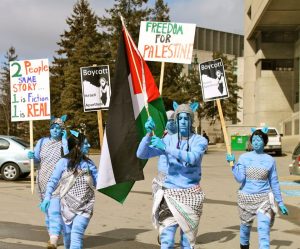 The
Israeli propaganda machine is in full swing this time of the year.
Israel's image as the 'only liberal democracy in the Middle East'
continues to be tarnished as Israeli Apartheid Week (IAW) and BDS
(Boycotts, Divestments, Sanctions) grow as a grass roots movements on
campuses across the globe. Israel's positive image in the North American
psyche is the one thing which has allowed it to continue its brutality
against the Palestinians without any backlash from the general public.
The fact that its image is slowly undergoing a seismic shift shakes
Israel to the core.
The
Israeli propaganda machine is in full swing this time of the year.
Israel's image as the 'only liberal democracy in the Middle East'
continues to be tarnished as Israeli Apartheid Week (IAW) and BDS
(Boycotts, Divestments, Sanctions) grow as a grass roots movements on
campuses across the globe. Israel's positive image in the North American
psyche is the one thing which has allowed it to continue its brutality
against the Palestinians without any backlash from the general public.
The fact that its image is slowly undergoing a seismic shift shakes
Israel to the core.Israel's nervousness and isolation is best indicated by the attempts to counter this movement. It has organized massive public relation campaigns, initiated events such as Israel Peace Week and has sent out delegations on speaking tours all over the world. Condemnation of IAW pour in from right-wing politicians and media outlets continue to brand the event as a hate fest which is rooted in misinformation and anti-Semitism.
All this comes at a time when informed commentators agree that Israel implements a system of apartheid. A recent report by the United Nations concluded that Israeli policies in the Palestinian territories 'exhibit features of colonialism and apartheid'. B'Tasleem, Israel's leading human rights organization, published in its report Land Grab that Israel 'has created a system of legally sanctioned separation based on discrimination that has, perhaps, no parallel any where in the world since the apartheid regime of South Africa'. The Human Sciences Research Council of South Africa also concluded in its legal study that Israel is guilty of apartheid crimes.

Why use apartheid?
The Israeli-Palestinian conflict is a multi-faceted one. At the core of it lies an illegal occupation coupled with innumerable human rights violations, war crimes, terrorism, ethnic cleansing, colonialism and apartheid. Solidarity activists of the past largely focused their struggle around ending the occupation, human rights violations and state-sponsored terrorism.
Focusing on the apartheid nature of the occupation represents a newer strategy in the movement, and perhaps the most effective one to date. This is a dimension of the conflict which was ignored largely in the past; partially because it is something which has developed overtime. It is the aspect of the conflict which affects Palestinians everyday. Apartheid is a term which stirs strong emotions in the Western psyche; by exposing Israel as a perpetrator of this crime one has a much higher chance of changing public opinion towards the Zionist state. This has also allowed activists to structure their strategies in a similar fashion to the anti-apartheid movement of the 1980's. The apartheid policies of South Africa ended shortly after US withdrew its support for the regime. By forcing our governments to change their unequivocal support of Israel, we have the greatest chance of aiding an end to the conflict.
Israeli Apartheid Week is a unique (and proud!) Canadian contribution to the Palestinian solidarity movement. It started off in 2005 at the University of Toronto by a group of dedicated student activists. It was shortly followed by the BDS Call (Boycotts, Divestments, Sanctions) made by 170 Palestinian civil societies. Through lectures, protests, concerts and film screenings, this week is dedicated to raising awareness about the atrocities being committed against the Palestinian people. It also focuses on measures that can be employed by average citizens to help end Israeli apartheid. The event is now organized on university campuses in over a 100 cities across the globe.
Success of the anti-apartheid movement for South Africa was rooted in educating the public about this inhumane system. Given the lack of knowledge about this issue amongst the masses and to emulate former movement, this series will seek to inform people about what apartheid is, why it applies to Israel and how we can help fight it.
Next Post: What is Apartheid?
No comments:
Post a Comment